Top Rankings
Pleasant Valley Joint Union Elementary School District ranks among the top 20% of public school district in California for:
Category
Attribute
Overall Rank
Highest overall rank (Top 10%)
Math Proficiency
Highest math proficiency (Top 5%)
Reading/Language Arts Proficiency
Highest reading/language arts proficiency (Top 10%)
Science Proficiency
Highest science proficiency (Top 20%)
Student Attention
Lowest student:teacher ratio (Top 1%)
For the 2025 school year, there is 1 public school serving 50 students in Pleasant Valley Joint Union Elementary School District. This district's average testing ranking is 10/10, which is in the top 5% of public schools in California.
Public School in Pleasant Valley Joint Union Elementary School District have an average math proficiency score of 70% (versus the California public school average of 33%), and reading proficiency score of 70% (versus the 47% statewide average).
Minority enrollment is 40% of the student body (majority Hispanic), which is less than the California public school average of 80% (majority Hispanic).
Overview
This School District
This State (CA)
# Schools
1 School
10,369 Schools
# Students
50 Students
5,826,838 Students
# Teachers
4 Teachers
268,018 Teachers
Student : Teacher Ratio
13:1
13:1
District Rank
Pleasant Valley Joint Union Elementary School District, which is ranked #103 of all 1,925 school districts in California (based off of combined math and reading proficiency testing data) for the 2021-2022 school year.
Overall District Rank
#109 out of 1941 school districts
(Top 10%)
(Top 10%)
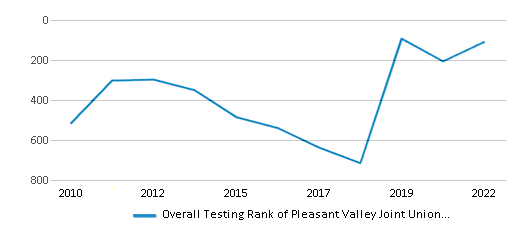
Math Test Scores (% Proficient)
60-79%
33%
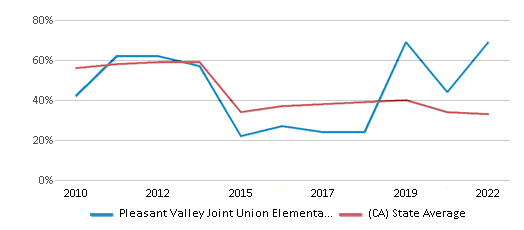
Reading/Language Arts Test Scores (% Proficient)
60-79%
47%
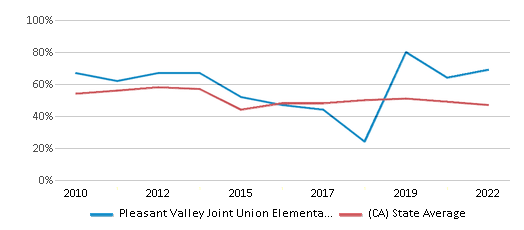
Science Test Scores (% Proficient)
<50%
29%
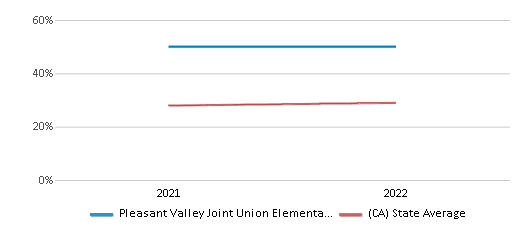
Students by Ethnicity:
Diversity Score
0.55
0.63
# American Indian Students
1 Student
25,796 Students
% American Indian Students
2%
1%
# Asian Students
1 Student
705,807 Students
% Asian Students
2%
12%
# Hispanic Students
15 Students
3,264,561 Students
% Hispanic Students
30%
56%
# Black Students
n/a
286,112 Students
% Black Students
n/a
5%
# White Students
30 Students
1,178,558 Students
% White Students
60%
20%
# Hawaiian Students
n/a
23,731 Students
% Hawaiian Students
n/a
n/a
# Two or more races Students
3 Students
333,755 Students
% of Two or more races Students
6%
6%
Students by Grade:
# Students in PK Grade:
-
83
# Students in K Grade:
10
522,456
# Students in 1st Grade:
5
396,605
# Students in 2nd Grade:
7
414,466
# Students in 3rd Grade:
10
416,628
# Students in 4th Grade:
11
426,361
# Students in 5th Grade:
3
430,587
# Students in 6th Grade:
4
432,997
# Students in 7th Grade:
-
439,621
# Students in 8th Grade:
-
441,777
# Students in 9th Grade:
-
466,534
# Students in 10th Grade:
-
476,585
# Students in 11th Grade:
-
469,511
# Students in 12th Grade:
-
492,627
# Ungraded Students:
-
-
District Revenue and Spending
Total Revenue
$1 MM
$116,387 MM
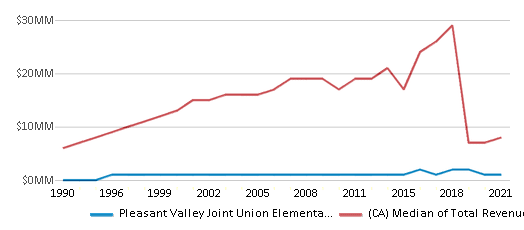
Spending
$1 MM
$107,188 MM
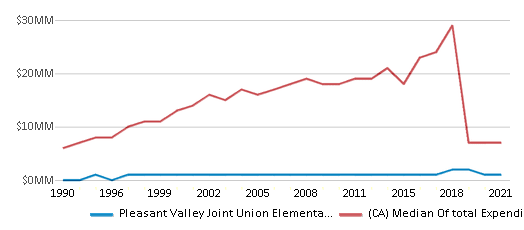
Revenue / Student
$21,103
$15,669
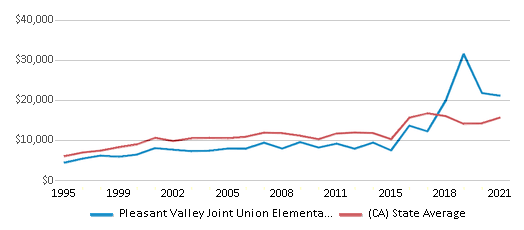
Spending / Student
$18,759
$13,970
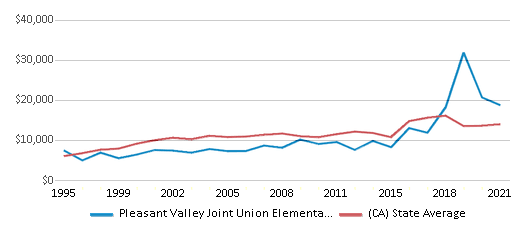
Best Pleasant Valley Joint Union Elementary School District Public Schools (2025)
School
(Math and Reading Proficiency)
(Math and Reading Proficiency)
Location
Grades
Students
Rank: #11.
Pleasant Valley Elementary School
(Math: 60-79% | Reading: 60-79%)
Rank:
Rank:
10/
Top 10%10
2025 Ranchita Canyon Rd.
San Miguel, CA 93451
(805) 467-3453
San Miguel, CA 93451
(805) 467-3453
Grades: K-6
| 50 students
Frequently Asked Questions
How many schools belong to Pleasant Valley Joint Union Elementary School District?
Pleasant Valley Joint Union Elementary School District manages 1 public schools serving 50 students.
What is the rank of Pleasant Valley Joint Union Elementary School District?
Pleasant Valley Joint Union Elementary School District is ranked #103 out of 1,925 school districts in California (top 10%) based off of combined math and reading proficiency testing data for the 2021-2022 school year. This district ranks in the top 20% of California school districts for: Highest overall rank (Top 10%), Highest math proficiency (Top 5%), Highest reading/language arts proficiency (Top 10%), Highest science proficiency (Top 20%) and Lowest student:teacher ratio (Top 1%)
What is the racial composition of students in Pleasant Valley Joint Union Elementary School District?
60% of Pleasant Valley Joint Union Elementary School District students are White, 30% of students are Hispanic, 6% of students are Two or more races, 2% of students are American Indian, and 2% of students are Asian.
What is the student/teacher ratio of Pleasant Valley Joint Union Elementary School District?
Pleasant Valley Joint Union Elementary School District has a student/teacher ratio of 13:1, which is lower than the California state average of 22:1.
Recent Articles

Year-Round Or Traditional Schedule?
Which is more appropriate for your child? A year-round attendance schedule or traditional schedule? We look at the pros and cons.

Why You Should Encourage Your Child to Join a Sports Team
Participating in team sports has a great many benefits for children, there is no doubt. In this article you will learn what those benefits are.

White Students are Now the Minority in U.S. Public Schools
Increasing birth rates among immigrant families from Asia and Central and South America, combined with lower birth rates among white families, means that for the first time in history, public school students in the United States are majority-minority. This shift in demographics poses difficulties for schools as they work to accommodate children of varying language abilities and socio-economic backgrounds.





